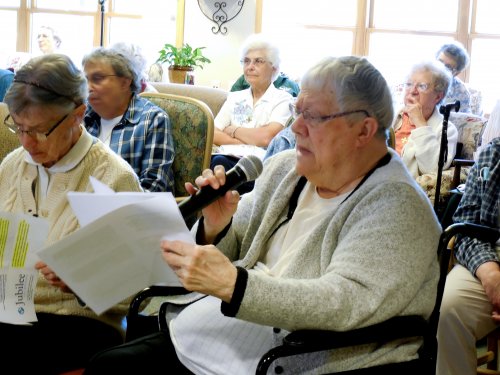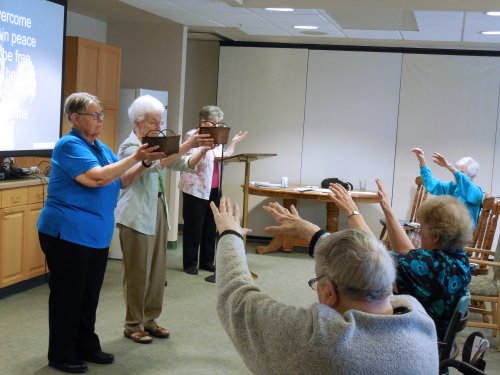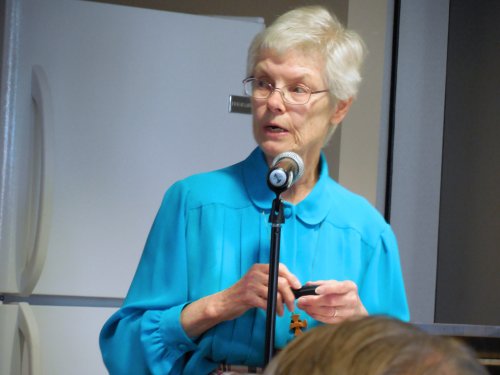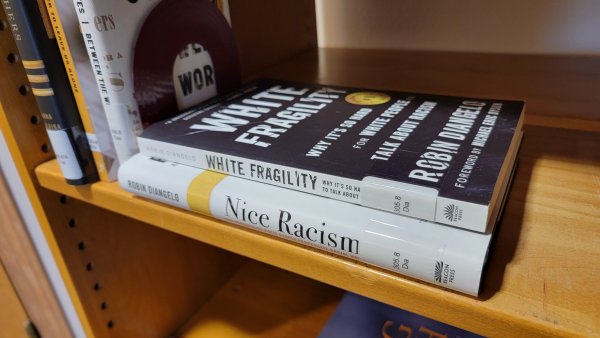 |
| LEARNING TO UNLEARN RACISM: The library at St. Francis Convent includes a wide variety of materials from theology, spirituality, prayer and social justice topics such as racism. (Renae Bauer photo) |
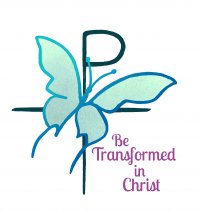 by Sister Carolyn Zahringer
by Sister Carolyn Zahringer
and Sister Sally Ann Brickner
As our Community prepared for its 39th General Chapter in the months leading up to May 2022, we chose as our theme “Be Transformed in Christ.” For our Chapter logo, Sister Nancy Langlois captured the image of a luminous butterfly transfixed to the Cross of Christ. Just as a caterpillar forms a chrysalis within which it dies and is transformed into the butterfly, so does God, through the power of the Holy Spirit, actively work within and among us to transform us ever gradually into the image of Jesus Christ. This gradual process of conversion, of being turned to the Lord, requires a daily dying and rising as we let go of the “old self,” our blind spots.
A Chapter is a time for discernment of direction by the Holy Spirit. Where might we need ongoing conversion of heart? St. Francis of Assisi, our patron, declared conversion of heart to be the fundamental value for his followers. We pondered together the ways in which our hearts need transformation.
Sisters Agnes Fischer, Mary Berg, Sally Ann Brickner, Anne Margaret Carmody, Marilyn Herr, Carolyn Zahringer, and Associate Rose Denissen invited the Community to look at how racial injustice affects us personally and its impact on society. They pointed to the 2018 pastoral letter of the Catholic Bishopsi and also recent resolutions by the Leadership Conference of Women Religiousii and the Franciscan Federationiii that urged conversion from the sin of racism.
First steps
We observed that our Community has already engaged in actions related to anti-racism. For example, for more than 20 years we have publicly advocated against the death penalty that is imposed more often on people of color. Also, for almost a decade we have worked to end modern slavery and human trafficking, which more often impacts people of color in countries throughout the world and in the USA. In addition, through our work on sustainability we have studied environmental racism. However, we recognized that additional actions could be taken to confront racism more personally and more directly. We considered some actions to which we could commit.
Alfred, Lord Tennyson wrote these powerful words, “More things are wrought by prayer than this world dreams of.” So, first and foremost, Sisters could commit to prayer for justice and healing for victims of racism.
Secondly, Sisters could commit to removing racist language, attitudes and behaviors that undermine the God-given dignity of others. This requires consciousness of the racial undertones in words or phrases that one uses. For example, a person might say of a Black speaker: “She was so articulate!” or “so smart!” thus conveying surprise at hearing or reading a learned presentation from a person of color. Other examples of racist behavior would be crossing the street to avoid meeting a person of color or failing to condemn racist jokes or comments.
What is ‘white privilege’?
Sisters could also commit to learning about white privilege and to raising awareness of systemic racism. Frances E. Kendall, author of “Diversity in the Classroom” and “Understanding White Privilege: Creating Pathways to Authentic Relationships Across Race,” defines white privilege as: “having greater access to power and resources than people of color [in the same situation] do.”iv
Privilege is a challenging concept or label that people usually wouldn’t use to describe themselves. Why? Many of us believe it was personal hard work that enabled us to achieve our place in society. We remain oblivious of systems – educational, political, economic, environmental, legal – that have allowed us to gain advantages more readily. For example, obtaining housing loans or purchasing a home in certain neighborhoods has historically been more difficult for people of color. Commitment to addressing personal privilege and to raising consciousness of systemic racism is very difficult but urgently necessary in order to undue the harms of racism.
A journey inside and out
Conversion from the sin of racism enables us to follow the Holy Spirit and be more closely conformed to Christ who urged us to love and to live in unity with one another. It is fitting, therefore, that during our 2022 Chapter our Community embraced anti-racism as one of our directions for action during the next four years. We invite you to journey with us in the continuous challenge of ending racism within ourselves and in society.
Many excellent books have been written to help us learn ways to overcome racism. Robin DiAngelo’s books, “White Fragility” (Beacon Press, 2018) and “Nice Racism” (Beacon Press, 2021) enable readers to explore how they perpetuate racial harm. Two other authors write compellingly of the personal, inner work required for conversion from the sin of racism. Patrick St. Jean, S.J., wrote “The Spiritual Work of Racial Justice: A Month of Meditations with Ignatius of Loyola” (Harding House Publishing, 2021). Rhonda V. Magee authored “The Inner Work of Racial Justice” (Tarcher Perigree, 2019).
These books merit a place on our reading list for the new year!
i Committee on Cultural Diversity in the Church. “Open Wide Our Hearts: The Enduring Call to Love - A Pastoral Letter Against Racism.” US Conference of Catholic Bishops, 2018. Ad Hoc Committee Against Racism, www.usccb.org/committees/ad-hoc-committee-against-racism
ii “Dismantle Racism and White Supremacy.” Leadership Conference of Women Religious. https://lcwr.org/social-justice/priority-justice-concerns/dismantle-racism-and-white-supremacy
iii Commission of Justice, Peace and Integrity of Creation. “JPIC 2021-2022 Statement.” Franciscan Federation. JPIC 2021-2022 Resolution, https://franfed.org/2021/06/10/jpic-2021-2022-resolution/
iv Colins, Cory. “What is White Privilege, Really?” Learning for Justice. Southern Poverty Law Center, Issue 60, Fall, 2018. https://www.learningforjustice.org/magazine/fall-2018/what-is-white-privilege-really
